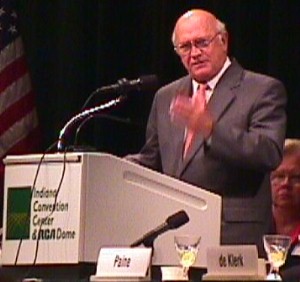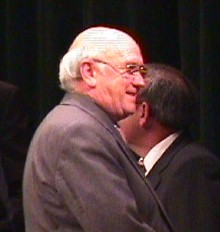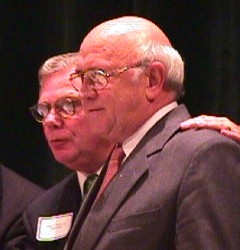F.W. de Klerk
Nobel Prize Winning former President of South Africa
Addresses Indianapolis Economic Club September 17, 1998
by Victor Kubik
I had the opportunity to speak briefly to former President of South Africa, F.W. de Klerk
telling him how motivated and inspired I was by his speech to the Indianapolis Economic
Club and how the principles he presented could be universally applied to bring peace. I
also told him how much I have appreciated visiting South Africa two years ago.
I'd like to share some of what he said below. It gave me much food for thought about what can be done to make people work together in many arenas, not the least being the religious Diaspora.
Mr. de Klerk's voice was powerful and booming, a man speaking with authority and passion about what he believed. He was most statesmanlike in deferring to and respecting his audience.
It is one thing to hear about world leaders. It is another to hear exactly what and HOW they present themselves. F. W. de Klerk has courageously brought a peaceful path of political reform to one of the most complex societies on this planet.
His unselfishness was obvious. He wanted to find a way to bring coexistence and a working together with many diverse people who call South Africa their home.
His vision and execution of his plan have helped shape the destiny of his nation. In 1989 the world was poised for the worst from South Africa. Instead a seemingly miraculous transition of power occurred that has made a nation with only 14% white population live reasonably with a complex mixture of black peoples.
Here are some benchmarks of F.W. de Klerk's history:
1972 -- Elected to the South African
Parliament
1978 -- Elected to the Cabinet
1989 -- Became leader of his Party
1989 -- Elected President of South Africa
Five months after his election to President he made a historic decision to release Nelson Mandela from prison on Robin Island off Capetown and ending 60 years of apartheid and control of the country by the minority white population.
1993 -- Won the Nobel Peace Prize with Nelson Mandela and the same year shared the honor as Time magazine's "Man of the Year."

F. W. de Klerk's speech began by his talking about unprecedented growth and change in the past century that eclipsed the progress of the 1900 centuries previously.
His message rested on four points, four realities that we must deal with as we enter the 21st century.
- Increased Globalization
- Continued Religious and Ethnic Conflict
- Inevitability of Fundamental Change
- Poverty and Underdevelopment
Globalization
Whether we like it or not, we're all affected by global politics and economics.
South Africa has increasingly become embroiled in problems that are not theirs, citing the conflict between the United States and Islamic Fundamentalism in the recent bombings and consequent retaliations in Kenya and Tanzania. Immediately South Africa became a target of retaliation when a Capetown restaurant was bombed.
Countries around the world are affected by what goes on in various places around the world that are seemingly unrelated. For example, Africa which has a most stable banking system is affected by negative uncertainties of President Clinton Clinton's problems regarding the Monica Lewinsky affair.
The reality, he went on, is not to ignore problems in remote parts of the world. We can't write off poorer countries as economic basket cases and forget them. What happens in remote parts of the world affects us all, citing what has happened with the Asian markets and financial instability in Russia. This is a world with less borders but more dangers.
We need skilled leaders that who are desirous of addressing world problems.
Continued Religious and Ethnic Conflict
Ultimately the source of most conflict is religious, ethnic and cultural. We have to work with the ideal that there is room and space for all of us on this earth and need to be tolerant of one another.
An important lesson of negotiation is management of change. Leadership is essential.
We have to reach fundamental agreements even when there are strong conflicting agendas. Negotiation cannot be done with the aim of being the victor and crushing an opponent. That won't bring lasting peace.
Having countries who are the "Big Boys" decide the future of the world won't work. The process must include smaller nations as role players. You cannot decide what is best for others by yourself. You must ask what is needed by those who will be needing it.
Personality plays an important role. He spoke about he and Nelson Mandela had extremely strong disagreements and deadlocks but worked through them.
Negotiation involves risk and sometimes one must make leaps of faith. Learning to compromise and bring about Win-Win solutions and you might have to make painful departures from original negotiating positions. Success comes when the reasonable interests of all parties are addressed
Inevitability of Fundamental Change
Nothing endures but change. The revolution that we're going through in the world
today can be likened to the vast transformation brought about by the Industrial
Revolution. We need leaders to manage and lead that change.
Mr. de Klerk spoke about happened in the late 80's when the world was expecting a crisis in South Africa, yet it was averted.
Overcoming natural resistance to change and clinging to what you're used to. Leaders must be first face facts and ask what's wrong? Old dreams may fail to bring justice.
We must be ready to lead a process of change.
Here's what leaders must do:
- Face the facts
- Present constituents a new vision, but stating that vision in such a way that it expresses the NEED to change and that there is a way which change CAN be achieved.
- Must provide inspiration, an action plan and strategy.
He spoke of how his vision was to bring unity, one citizenship, one man/one vote to Africa and eliminate apartheid. They had a choice of doing this gradually or as a quantum leap. They took the quantum leap approach and turned things around 180 degrees. If they would have taken the gradual route, the impression might be that they were changing only under pressure. At first he felt that those outside of Africa thought they were bluffing, but credibility was built when words were turned into deeds.
The plan involved:
- The release of Nelson Mandela
- Decision of how the change was going to take place
- Leveling of the playing field
- Involvement of broadest amount of leaders who then felt part of the process
- Forging a vision and action plan
He said that the changes in South Africa were not a miracle. They came as a result of careful planning and hard work with vision. It brought justice to all and became the basis for constitutional and economic development as agreement came to a policy framework.
Poverty and Underdevelopment
A developing country must provide for poorer countries. Markets must be opened to developing countries and a way must be found to protect that the poorer countries won't be preyed upon.
These are the big challenges to the global community of the 21st century.
The world is looking to
- The United States
- The G7
- European Union
To do something about
- Growth
- Development
- Peace
----
I would personally like to thank UCG elder Tom Peine and his wife for inviting me to this Economic Club of Indianapolis luncheon. It was one of the most stimulating addresses I have heard.
(photos by Victor Kubik)